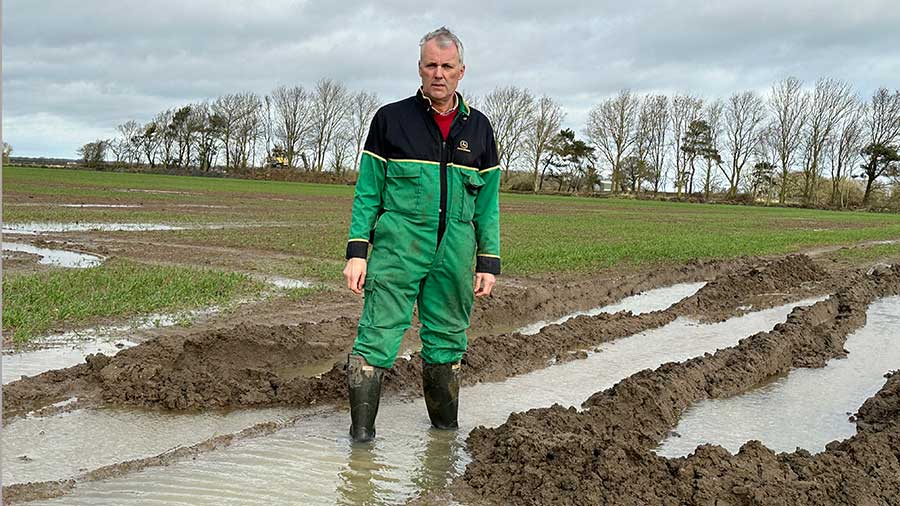Further wet weather raises fears of harvest catastrophe
 Farmer Andrew Ward stands in a rutt his sprayer nearly got stuck in © Andrew Warc
Farmer Andrew Ward stands in a rutt his sprayer nearly got stuck in © Andrew Warc Further heavy rainfall over the last fortnight is increasing farmers’ concerns of an impending harvest catastrophe.
Following relentless rain since October and more heavy rainfall on the horizon, harvest prospects are looking bleak.
Farmers who were unable to plant winter crops in the autumn had been banking on a decent dry spring to be able to plant those same fields with springs crops.
See also: Plantings hit by rain helps extend new-crop wheat premium
But the prospects of establishing spring crops are looking increasingly slim as fields are waterlogged and the soil structure is severely damaged by continuous wet weather.
Spring crops planted late always pushes back harvest, which has an impact on the grower’s ability to establish next year’s crops in the ground on time.
Late-drilled spring crops also tend to perform badly in terms of yields and quality.
Spraying operations hit
Crops sown last autumn are now needing nitrogen and agchems but the current wet ground conditions mean these operations are not happening in some cases. This will have a further impact on crop yields and quality.
Prospects for drilled winter wheat crops are poor due to waterlogging and some of these fields will need to be replanted with spring crops.
Last year’s spring was similarly wet, which meant some crops were late drilled, as was the case for Lincolnshire grower Andrew Ward.
The majority of Mr Ward’s spring crops were not planted until 20 April and the following two months were very dry which was disastrous for yields. But reasonably high commodity prices cushioned the blow.
However, this spring farmers are facing rock bottom commodity prices which will hit farm profitability hard.
“We are fortunate that we have a farm on Lincolnshire heath which has free-draining sandy soil over limestone,” said Mr Ward. “We have been constantly changing cropping in order to fulfil current malting barley contracts.”
But this is in stark contrast to the high clay and silt soils on the main farm at Glebe Farm, Leadenham, where only 50% of the planned winter wheat was drilled.
Mr Ward has always intended to plant spring wheat and spring oats in any fields not planted with winter wheat. But he has “real concerns” about the prospects of establishing these crops with the current soil conditions not improving.
Any fields not planted with spring crops by 10 April will remain fallow following last year’s bad experience.
This will enable a lot of remedial cultivation work to be carried out in the summer, which in turn would mean an early start to drilling for next year’s winter wheat crops.
Sugar beet is an exception to this deadline.
Last year’s beet crop on heavy land was not able to be planted until 5 May.
It then suffered eight weeks without rainfall, was harvested on 26 September, but still managed to return a respectable yield of 68t/ha which would have been higher if the sugar content had not been so low.
Last year, in conjunction with Warwick University and Agrii, the farm grew the first commercial crop of Capulet beans for the baked bean market. This was so successful that the area is increasing from 6ha to 77ha this year.
But as the beans do not need to be drilled until early May, Mr Ward is confident these will go in on time.
‘Most challenging’ winter
Joe Stanley, head of sustainable farming and knowledge exchange at the Game and Wildlife Conservation Trust’s (GWCT) Allerton Project in Leicestershire, described this winter as the “most challenging” he had ever experienced in farming.
Travelling around the country, he says farmers are in the same boat of “waterlogged fields, atrocious winter cropping, huge areas of unplanted stubbles and green cover”.
Soil erosion is at an unprecedented scale and tramlines “look like they have been hosting tank manoeuvres from snatched fertiliser applications”.
At the Allerton Project, they are six weeks behind applying fertiliser – and it’s still raining.
“After spring 2023, it feels like déjà vu all over again,” said Mr Stanley, who is also a Farmers Weekly Opinion writer.
“With climate change set to make winters warmer and wetter on this model, farmers are really going to have to think hard about how they can make their system stack up under this sort of pressure.”
Scotland update
Mixed tenant farmer Zander Hughes farms between Dunfermline and Kirkcaldy, in Fife, and he also runs an arable contract farming business. He said farmers are feeling “frustrated” by the wet weather.
“We grabbed a week in October to get the winter wheats sown and it has not stopped raining since,” he said. “It’s not the volume of rain, but the constant 2-3mm all the time which is an issue. It’s just soul-destroying.
“The wheats that have gone in after potatoes are going to be three-quarter crops at best.”
In a normal year, spring crops would be drilled around now followed by oats. But the ground is too wet and soil temperatures are still very cold.
Although there is still time to drill spring crops, he fears the wet weather will increase slug pressure and elevate the risk of slug damage to newly sown crops.
Wales latest
NFU Cymru deputy president Abi Reader says the wet weather is frustrating lambing and will likely delay the turnout time for livestock.
As in England, the persistent rain is also preventing arable farmers in Wales from drilling spring crops. Those who were unable to drill winter cereals remain concerned about the availability of spring seed, she added.

